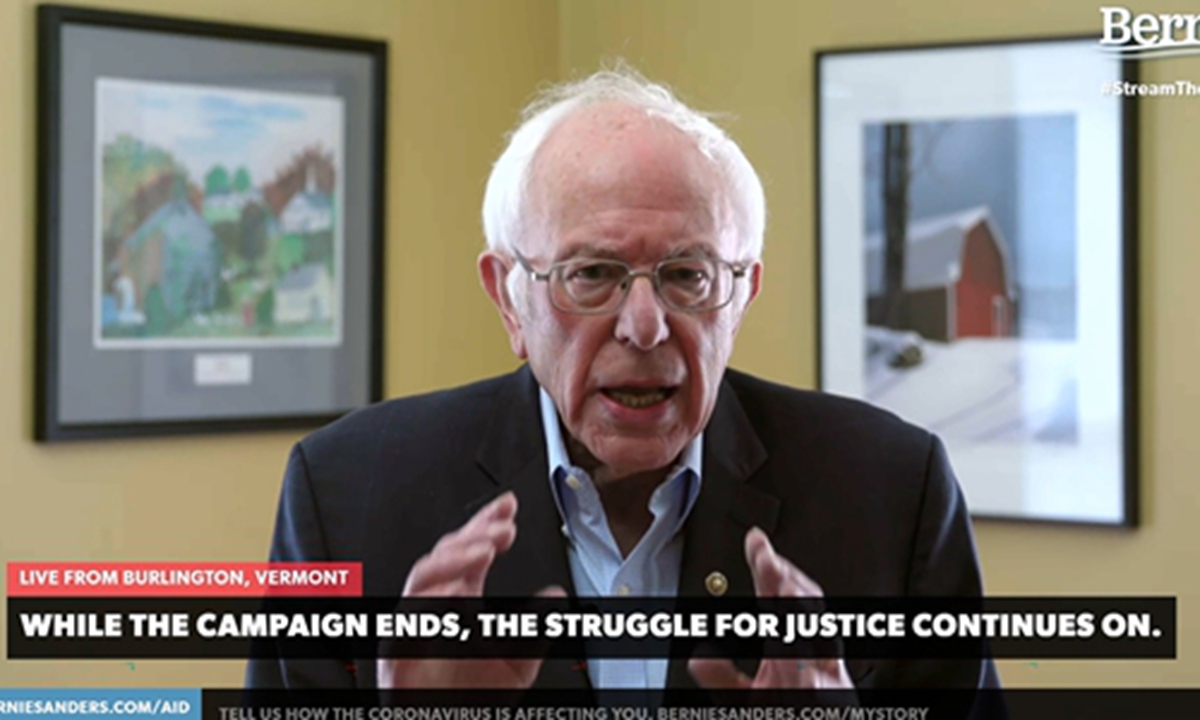
In this video still image from the Bernie Sanders Presidential Campaign, Sanders announces the suspension of his presidential campaign, from Burlington, Vermont. Photo: AFP
In an opinion piece for the journal Foreign Affairs entitled "Washington's Dangerous New Consensus on China" on Thursday, US Senator Bernie Sanders spoke out against a "dangerous" chorus that is pushing for a new Cold War with China. He said it is "distressing and dangerous" that "a fast-growing consensus is emerging in Washington that views the US-Chinese relationship as a zero-sum economic and military struggle."
Sanders believes compared to organizing US foreign policy around "a zero-sum global confrontation with China," there is a better way forward. He suggested the US makes itself more competitive with China by revitalizing American democracy, restoring people's faith in government by addressing the long-neglected needs of working families, creating millions of good-paying jobs, rebuilding US crumbling infrastructure and combating climate change. He also called for cooperation with China in areas such as climate change, pandemics, and nuclear proliferation.
Sanders views US domestic contradictions through the lens of China-US relations, and from perspective of restoring US global leadership. As the US is plagued by various social ills including weakening democracy, enlarging wealth gap, and a growing unemployment crisis, he believes the US should focus more on domestic challenges rather than confronting China.
The current US policy elites are stuck in a Cold War mentality when dealing with China, but Sanders thinks they have prescribed Washington the wrong medicine in handling relations with China. "Sanders is pushing forward a prescription that he thinks is less dangerous and could help resolve US domestic problems," Li Haidong, professor at the Institute of International Relations of the China Foreign Affairs University, told the Global Times.
Sanders is right that the US shouldn't engage in a "zero-sum global confrontation with China." But in his article, Sanders also writes that Americans should oppose China's so-called intellectual property theft and human rights abuses, and called for concern for "China's aggressive global ambitions." This is no deviation from the new consensus on China formed in Washington that he opposes.
Zhang Tengjun, an assistant research fellow at the China Institute of International Studies, said that accusing China of violating human rights has become a political correctness in the US, and although Sanders supports strengthening cooperation with China in certain fields, he won't challenge the political correctness and has to cater to mainstream voices toward China.
Sanders also argued that the decision to grant China "permanent normal trade relations" status over 20 years ago, which he opposed at that time, was disastrous. In his view, it didn't lead to China's economic liberalization but allowed US companies to move out of the country, resulting in the loss of a large number of jobs at home. However, he neglects the fact that the US as a whole has also benefited hugely from normalizing trade relations with China. What has gone wrong is the US wealth distribution system, under which the profits big US companies gain from the China market are not fairly shared with the US public.
The US now is facing many thorny domestic challenges. Incidents such as the Jan. 6 Capitol Hill riots have suggested that there is deep discontent fermenting inside the US society. The country needs a thorough reform to solve the domestic crisis. Can the US summon its strength and pull itself together? However, instead of mulling over how to tackle domestic headaches, US politicians and policy elites are more keen on shaping countries like China and Russia as enemies and advocating a confrontational approach. It's unclear how politicians such as Sanders can help correct the US' reckless China policy.


